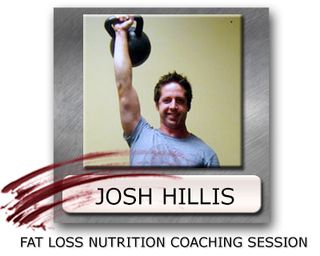It Doesn't Matter What You Had For Lunch Yesterday
Back in the day, I used to have a food journal tracking program that made it really easy to see weekly and monthly averages of calories, protein, carbs, and fat.
And I'll tell you a secret: Except for my most advanced clients, I never looked at my clients individual days or individual meals. It just didn't matter.
Every week we'd look at their weekly average, and I'd coach them from that.
And then at the end of the month, when we re-took their measurements, I'd coach them from their monthly average.
It evens out all of the B.S. when you look at the long term. No individual day matters very much. No individual meal matters at all. It's all about the average of what you are doing over the long haul.
If you're not sure about how bad that free day was? Take a look at what it did to your average. Think that perfect day made a big difference? Take a look at your average.
Extrapolate Your Thinking Long Term
The only downside of looking at the weekly or monthyl average is that it minimizes the impact of the small changes you make.
And make no mistake, small changes are the only ones that matter.
Lets say you've been struggling with dinner, and this week you totally upgraded 3 dinners. That might not look like much on your weekly average. And it probably makes even less difference on the monthly average yet.
So you have to change your thinking – extrapolate out to the whole month: If I cut 150 calories from three dinners this week, that means that if I keep it up all month that's 2025 total calories less than last month, which really does make a difference, in the long term.
You can play that same game with adding protein or chaning the ratio of fats to carbohydrates or whatever nutrition game you are playing that month.
And each week, when you make a new change, you start to stack these little habit changes on top of other habit changes. The results you are getting from one habit, that keep increasing as time goes by, are then combined with the results you get from the next habit, ongoing, as time goes by.
By the end of the month, stacking new habits and new little results has a huge exponential effect – even though it looked like you were only making small changes to a few meals per week.
How Hard Yesterday's Workout Was Doesn't Matter
It's the same with workouts. I don't care if you killed it on yesterdays workout. Really. I don't care at all.
I care about if you got in 12 workouts per month for the last three months.
I care about if last year you were using 8 kilogram kettlebells for everything, and this year you're using 12 kilogram kettlebells.
No individual workout ever matters at all for fat loss.
There's No Amount of Working Out
Even though the workouts are essential, they don't buy you what you want them to buy. There's no amount of working out that will effect 10% of what your diet effects for fat loss.
You want to impress me, show me your food preparation. Tell me about going to the market. Tell me about the new recipe you tried.
It's the long term of the food habits that will change your body forever. Look at what you are averaging, and you'll know exactly how you've earned the body you have now. And you'll see exactly what it would take to earn a different body, if that's your goal.
The Ultimate Key To Being Super Hot and Lean
Stop trying to do anything in one day to make it go faster.
Instead, work on mastering being the kind of person who is lean. Get good at all of the food habits. Start treating this like a lifestyle, instead of "something you are doing."
Stop looking at food habits like something being imposed on you by your nutrition plan. Start to look at your food habits of an expression of who you are.
When you internalize the food habits – when you become the source of them for yourself, then you are not only going to get lean, fit and hot, but you are also going to stay lean, fit, and hot.
by Josh Hillis
P.S. One of the best fat loss workouts I've ever written is called Fighter Workouts for Fat Loss, and is now available in Kindle format for under $3
P.P.S. I have a nutrition coaching audio for under $8:


Great article! The idea of making “what you are doing” a part of your identity is so important. When the mindset changes from “I’m on a diet” to “This is how I eat” magic happens or it seems like magic.
Thanks Cody! You’re totally right, that’s the most important part!
Josh, great post!
The identity concept, the small changes concept – both GOLD in my book.
Quick question for you, how do you go about calculating averages?
Great question Nick! In the old days, all of my clients used BodyMedia’s BodyBugg armband (which is now the BodyMedia FIT), and the food journal that came with it did a really amazing job of giving you long term reports – weekly, monthly, whatever. And even long term line graph of weight loss, had lots of cool stuff.
But the thing about the BodyMedia system was that we really ended up only using the food journal. Not that I don’t *love* the armband, but it didn’t actually inform any major changes to the what we were doing anyway, like the food journal did. So it ended up just being a fairly expensive food journal.
These days, my clients just use myfitnesspal, ’cause it’s free and it’s easy. So I don’t have the same automatic averages. I just get the weekly report from myfitnesspal, look at all seven days really quick and eyeball it.
That being said, I’m also getting a very different kind of client right now, and I am spending a lot more time looking at individual days to see about quality changes. But that’s the difference between training in a gym and training online. Online, the clients I get are actually mostly kettlebell instructors, or personal trainers, or super fit rockstars who are taking it to the next level. I’m used to training really fit “civilians”, so it’s been a little different lately.